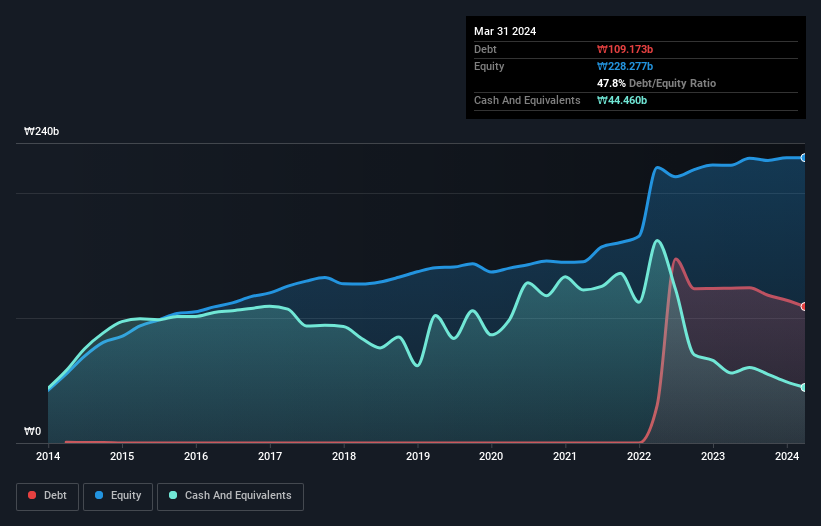Warren Buffett famously said, 'Volatility is far from synonymous with risk.' When we think about how risky a company is, we always like to look at its use of debt, since debt overload can lead to ruin. Importantly, Wemade Play Co., Ltd. (KOSDAQ:123420) does carry debt. But is this debt a concern to shareholders?
What Risk Does Debt Bring?
Generally speaking, debt only becomes a real problem when a company can't easily pay it off, either by raising capital or with its own cash flow. Ultimately, if the company can't fulfill its legal obligations to repay debt, shareholders could walk away with nothing. However, a more common (but still painful) scenario is that it has to raise new equity capital at a low price, thus permanently diluting shareholders. Of course, the upside of debt is that it often represents cheap capital, especially when it replaces dilution in a company with the ability to reinvest at high rates of return. When we examine debt levels, we first consider both cash and debt levels, together.
View our latest analysis for Wemade Play
What Is Wemade Play's Debt?
You can click the graphic below for the historical numbers, but it shows that Wemade Play had ₩109.2b of debt in March 2024, down from ₩123.9b, one year before. However, because it has a cash reserve of ₩44.5b, its net debt is less, at about ₩64.7b.

A Look At Wemade Play's Liabilities
The latest balance sheet data shows that Wemade Play had liabilities of ₩19.2b due within a year, and liabilities of ₩136.6b falling due after that. Offsetting this, it had ₩44.5b in cash and ₩10.0b in receivables that were due within 12 months. So its liabilities total ₩101.4b more than the combination of its cash and short-term receivables.
Given this deficit is actually higher than the company's market capitalization of ₩76.2b, we think shareholders really should watch Wemade Play's debt levels, like a parent watching their child ride a bike for the first time. In the scenario where the company had to clean up its balance sheet quickly, it seems likely shareholders would suffer extensive dilution. When analysing debt levels, the balance sheet is the obvious place to start. But you can't view debt in total isolation; since Wemade Play will need earnings to service that debt. So when considering debt, it's definitely worth looking at the earnings trend. Click here for an interactive snapshot.
In the last year Wemade Play had a loss before interest and tax, and actually shrunk its revenue by 6.8%, to ₩121b. That's not what we would hope to see.
Caveat Emptor
Importantly, Wemade Play had an earnings before interest and tax (EBIT) loss over the last year. Indeed, it lost ₩379m at the EBIT level. Considering that alongside the liabilities mentioned above make us nervous about the company. It would need to improve its operations quickly for us to be interested in it. But on the bright side the company actually produced a statutory profit of ₩4.7b and free cash flow of ₩5.8b. So one might argue that there's still a chance it can get things on the right track. When analysing debt levels, the balance sheet is the obvious place to start. However, not all investment risk resides within the balance sheet - far from it. For instance, we've identified 3 warning signs for Wemade Play (1 makes us a bit uncomfortable) you should be aware of.
If, after all that, you're more interested in a fast growing company with a rock-solid balance sheet, then check out our list of net cash growth stocks without delay.
Valuation is complex, but we're here to simplify it.
Discover if Wemade Play might be undervalued or overvalued with our detailed analysis, featuring fair value estimates, potential risks, dividends, insider trades, and its financial condition.
Access Free AnalysisHave feedback on this article? Concerned about the content? Get in touch with us directly. Alternatively, email editorial-team (at) simplywallst.com.
This article by Simply Wall St is general in nature. We provide commentary based on historical data and analyst forecasts only using an unbiased methodology and our articles are not intended to be financial advice. It does not constitute a recommendation to buy or sell any stock, and does not take account of your objectives, or your financial situation. We aim to bring you long-term focused analysis driven by fundamental data. Note that our analysis may not factor in the latest price-sensitive company announcements or qualitative material. Simply Wall St has no position in any stocks mentioned.
Have feedback on this article? Concerned about the content? Get in touch with us directly. Alternatively, email editorial-team@simplywallst.com
About KOSDAQ:A123420
Flawless balance sheet and good value.
Market Insights
Community Narratives



